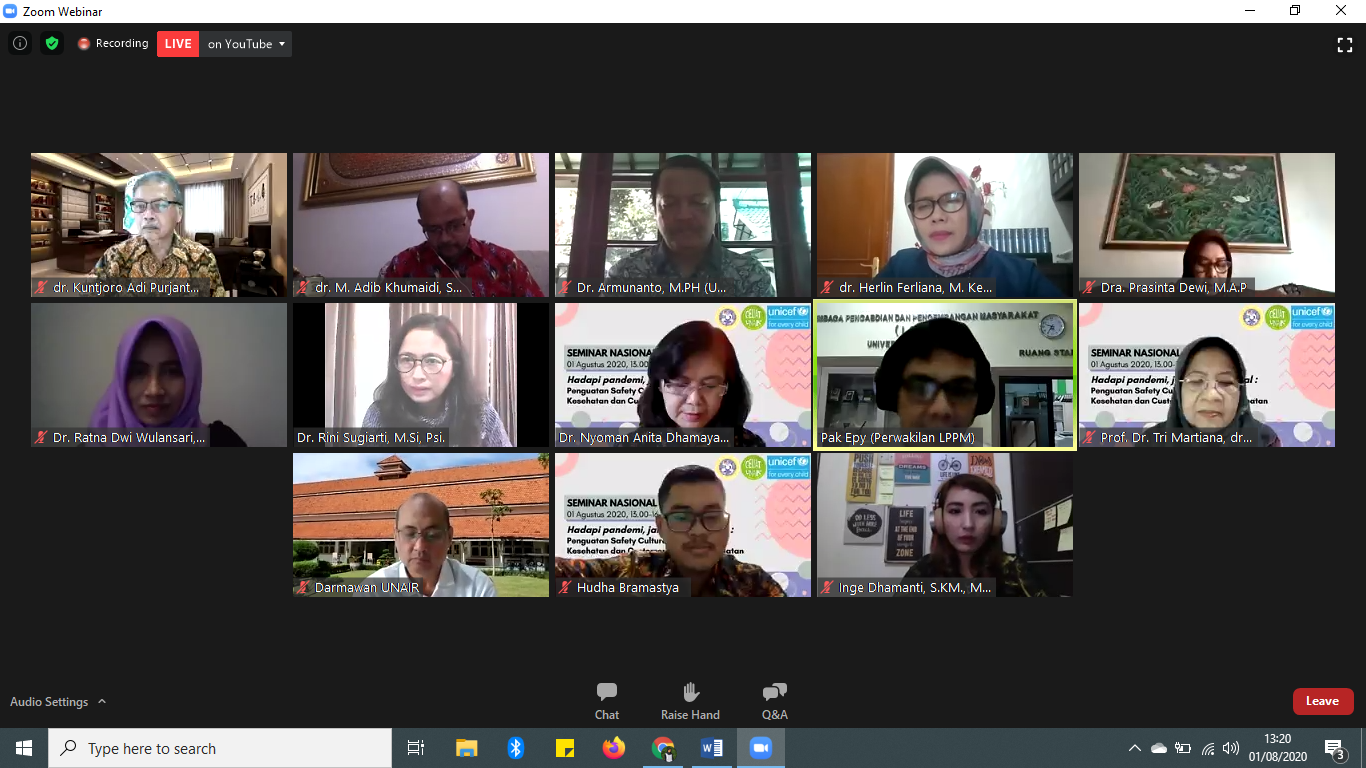UNAIR NEWS – Universitas Airlangga (UNAIR) held a webinar through UNAIR Healthy Pregnant Mothers and Children (GELIAT) Movement on Saturday, August 1, 2020 in collaboration with UNICEF. The topic was about reinforcing safety culture among medical workers and healthcare facility customers.
As an opening for the discussion, Dr. Nyoman Anita Damayanti, drg., MS as the person in charge of GELIAT program, presented the results of a survey on safety culture in the field of healthcare as a response to the COVID-19 pandemic. At least 773 respondents took part in the study.
“The ultimate goal of this study is to make recommendations to reinforce safety culture in healthcare facilities for protection of medical workers and customers,” said the FKM lecturer known as Nyoman.
Based on the survey results, 61.8 percent of respondents have attended training on personal-protection equipment (PPE), while another 38.2 percent did not attend the training.
Even so, it is known that 94.4 percent of respondents said they needed training in installing personal protective equipment (PPE), even though some of them had attended training. About 95.7 percent of respondents also said they needed training to remove the PPE.
“The reason medical workers use PPE with a percentage above 90% is for job security, avoiding COVID-19, and because of patient safety,” continued Nyoman.
Nyoman continued, another reason with the percentage and 80.5 percent was because of supervision and 81.2 percent was to avoid sanctions. Both reasons are taken into consideration, but the percentage is quite small when compared with other reasons.
For this reason, when management can make human resources (HR) feel the need to do something because of their personal and customer security , then a program will work. In order for the safety culture to work, leadership, organizational commitment, and commitment to allocating resources become very important.
“With the commitment, the culture can flourish and ultimately the supervision will be reduced because everyone already has the awareness and intention to stay safe,” explained Nyoman.
Some recommendations from the survey results showed that it is necessary to provide training as soon as possible and familiarize medical workers on putting on and taking off PPE. Then, it is also necessary to manage PPE before and after use, strengthen organizational, leadership and employee commitment, and reinforce the safety culture mindset.
“If the leadership does not have a commitment on safety culture, it will not be able to work. Because the leader has the authority to allocate resources, ” she continued.
At the end of the session, Nyoman reminded that the community, especially healthy people, to strive to maintain their health, so that fewer people must be hospitalized and medical personnel can focus better on treating patients who need the most.
The other speakers at the webinar were Dr. Rini Sugiarti, S.Psi., M.Psi., Psychologist (Dean of FPSi Un Semarang); Dra. Prasinta Dewi, M.A.P.(Deputy for Logistics and Equipment, BNPB); dr. M. Adib Khumaidi, Sp.OT (Vice Chairman 1 PB IDI); dr. Kuntjoro Adi Purjanto, M. Kes (Chairman of the Indonesian Hospital Association / PERSI); dr.Herlin Ferliana, M. Kes (Head of East Java Provincial Health Office); and dr. Agustin Kusumayati, M.Sc., Ph.D (Head of Association of Indonesian Public Health Institutions / AIPTKMI). (*)
Author: Galuh Mega Kurnia
Editor: Binti Q. Masruroh





